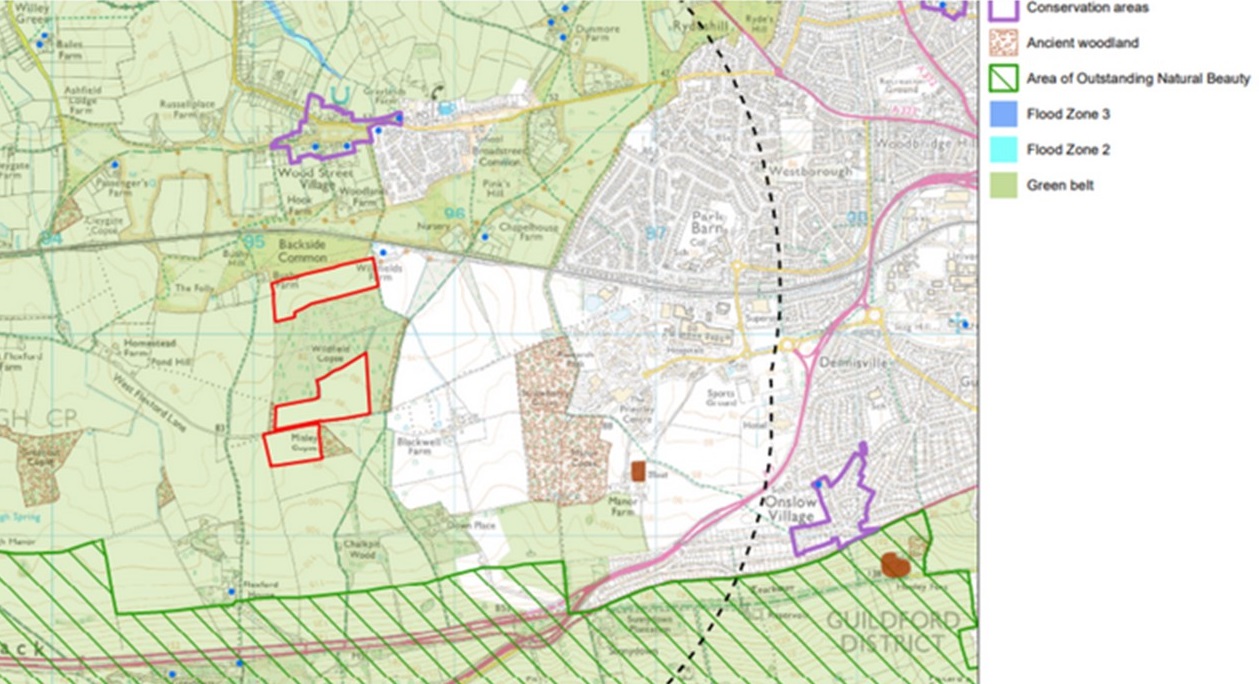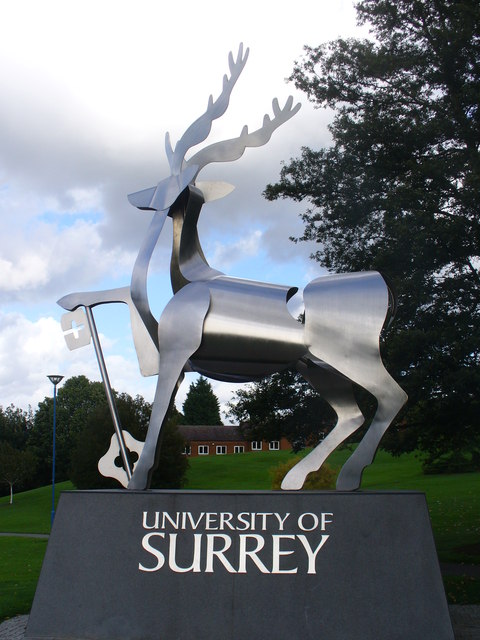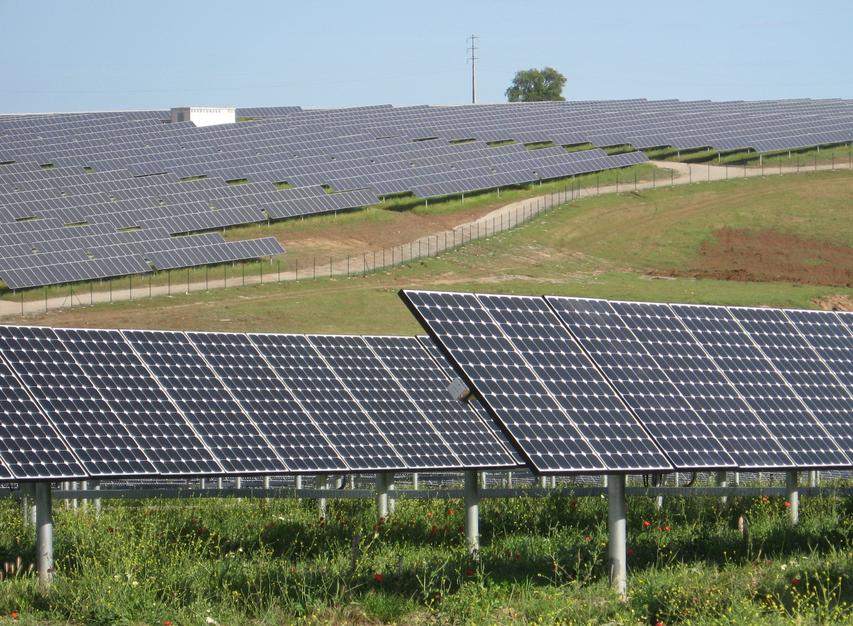 Abraham Lincoln
If given the truth, the people can be depended upon to meet any national crisis...
Abraham Lincoln
If given the truth, the people can be depended upon to meet any national crisis...
 Guildford news...
for Guildford people, brought to you by Guildford reporters - Guildford's own news service
Guildford news...
for Guildford people, brought to you by Guildford reporters - Guildford's own news service
Plans For Solar Power from Farmland, University Answers Its Critics
Published on: 22 Oct, 2022
Updated on: 25 Oct, 2022
By Hugh Coakley
Proposals by the University of Surrey and energy company SSE Energy Solution for a 12.2 megawatt solar farm on land owned by the university has attracted criticism among Dragon readers due to its siting on land farmed for food production rather than on the university’s roofs, car parks and open spaces.
A spokesperson for the university has responded saying the scale of the plans could not be accommodated on the Stag Hill campus adding that leaving the “lower quality” land fallow for 35 years would restore the “quality of the soil for future agricultural use, significantly outweighing any loss of currently limited agricultural use of a relatively small plot of land” with biodiversity advantages as well.

Proposed solar farm location on three fields, outlined in red, on the university-owned Blackwell Farm.
Guildford’s MP, Angela Richardson gave her support to the university’s plans after newspaper reports (The Guardian, October 10) had said the Liz Truss government was understood to be opposed to solar farms being developed on farmland. She said a “blanket ban” on solar farms on farmland would be “unwise”
Dragon reader Gill Jones, amongst others, had voiced her concerns at what she considered an inappropriate use of farmland. She wrote: “Why can’t solar panels be put on the university building roofs, car parks and open spaces on the campus that they have. In Europe, they are very inventive in siting solar panels.
“The only thing that should be built on farmland is food! We are in a food security crisis and there is a rush to build on farmland, it must be stopped.
“Madness in the making.”
 A spokesperson for the University of Surrey said: “In terms of roofs and car parks, the answer is one of scale. We can’t deliver the substantial increase in the proportion of our energy from home-grown renewable sources without the scale of the facility we are seeking to progress on the land at Blackwell. It is a comparatively small solar facility by industry standards, but still could not be accommodated on our Stag Hill campus. We will, however, continue to maximise the use of the roofs of our buildings to house solar panels.
A spokesperson for the University of Surrey said: “In terms of roofs and car parks, the answer is one of scale. We can’t deliver the substantial increase in the proportion of our energy from home-grown renewable sources without the scale of the facility we are seeking to progress on the land at Blackwell. It is a comparatively small solar facility by industry standards, but still could not be accommodated on our Stag Hill campus. We will, however, continue to maximise the use of the roofs of our buildings to house solar panels.
“In terms of the question on agricultural land, most of the land on which the solar facility will be sited is of a lower quality (grade 3b, in official terminology) – which is of limited use for food production. Current uses of the land are “monocultural” – ie a single species is planted.
“Once the solar facility is in place, the land will be planted with wild grasses and/or meadow mixes, significantly increasing biodiversity – both in terms of plant and wildlife habitats.
“We are clear that the environmental benefits of the solar facility – in terms of carbon reduction, biodiversity enhancement and, over the 35-year lifespan of the project, restoration of the quality of the soil for future agricultural use – significantly outweigh any loss of currently limited agricultural use of a relatively small plot of land.
“It is also worth noting that the overwhelming responses from those who have engaged with our consultation on this proposal to date has been positive. This really is a very positive project, with clear environmental benefits.”
See Consultation Starts On Proposed Solar Farm For University Of Surrey (June 2022)
Responses to Plans For Solar Power from Farmland, University Answers Its Critics
Leave a Comment Cancel reply
Please see our comments policy. All comments are moderated and may take time to appear. Full names, or at least initial and surname, must be given.
Click on cartoon for Dragon story: Public Asked for Views on SCC’s Proposal for Reduced Speed Limits


Recent Articles
- One Homeowner Recompensed but Fight Continues Over Waverley CIL Charges
- Letter: Fine Those Guilty of Anti Social Behaviour
- GBC Working Hard To Mitigate Looming Weyside Urban Village Deficit
- Letter: Rapist Also Spearheaded Vicious Campaign Against the PCC
- Notice: Guildford Festival of the Arts – September 2025
- Police Investigating Wildlife Attacks At Fleet Pond Issue Three E-fits
- Wildlife Conservation Project Seeks To Protect Some of Surrey’s Rarest Habitats
- Dragon Interview: What’s Reform Guildford’s View of Local Government Reorganisation?
- ‘Astonishingly Clever’ SCC Show Garden Wins Silver for Turning Parking Spaces Green
- New Air Quality Strategy to Improve Pollution Approved by Guildford Borough Council


Recent Comments
- M Durant on Online Event Will ‘Help Residents Have Their Say On Local Government Reorganisation’
- Jim Allen on GBC Working Hard To Mitigate Looming Weyside Urban Village Deficit
- Tony Harrison on Letter: A Simple Footbridge Should Have Been Affordable to Keep Towpath Over Weir Open
- David Lee on Making History As Pewley School’s Class of ’54 Hold Their Final Reunion
- David Milne on GBC Asks Residents for Views on Its Draft Building Height Guidance
- Nigel Crutchley on Drivers Caught in Yellow Box Junctions at the Dennis Roundabout Paid £81k to SCC
Search in Site
Media Gallery
Dragon Interview: Local Artist Leaves Her Mark At One of England’s Most Historic Buildings
January 21, 2023 / No Comment / Read MoreDragon Interview: Lib Dem Planning Chair: ‘Current Policy Doesn’t Work for Local People’
January 19, 2023 / No Comment / Read MoreA3 Tunnel in Guildford ‘Necessary’ for New Homes, Says Guildford’s MP
January 10, 2023 / No Comment / Read More‘Madness’ for London Road Scheme to Go Ahead Against ‘Huge Opposition’, Says SCC Leader
January 6, 2023 / No Comment / Read MoreCouncillor’s Son Starts Campaign for More Consultation on North Street Plan
December 30, 2022 / No Comment / Read MoreCounty Council Climbs Down Over London Road Works – Further ‘Engagement’ Period Announced
December 14, 2022 / No Comment / Read MoreDragon Interview: GBC Reaction to the Government’s Expected Decision to Relax Housing Targets
December 7, 2022 / No Comment / Read MoreHow Can Our Town Centre Businesses Recover? Watch the Shop Front Debate
May 18, 2020 / No Comment / Read More







Lisa Wright
October 23, 2022 at 1:03 pm
What nonsense.
The University of Surrey spokesman has conveniently only spoken about their Stag Hill Site but we must also consider the land, buildings and car parks at Manor Farm and The Surrey Research Park.
Additionally, why should we allow the university to take more land from our green belt farmland when they have already been allocated hundreds of acres for development at Blackwell Farm under the Guildford Local Plan?
More work is required to make a solar farm truly efficient by utilising the infrastructure the university already has. Perhaps our MP may like to visit the sites to really get a grasp of the amount of farmland and subsequent loss of human food and animal/bird/insect and fauna habitat that both the Blackwell Farm and solar sites will destroy if developed.
Whilst I am totally in agreement that our energy must come from greener sources, this is one of those badly thought out and greedy applications that must be opposed.
Peter Elliott
October 24, 2022 at 10:38 am
I agree 100 per cent with Gill Jones. The government has made it clear that siting solar farms on productive farmland should be a last resort, not a first resort.
As well as all the empty roofs on the University’s Manor Park site, there are all those in the research park. If Angela Richardson [MP] took a walk round there, she would see 30-odd large commercial buildings, with acres of empty roof space.